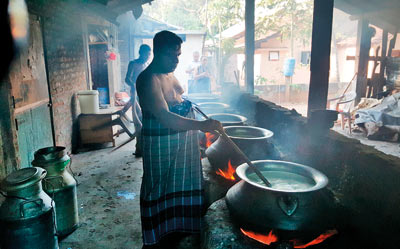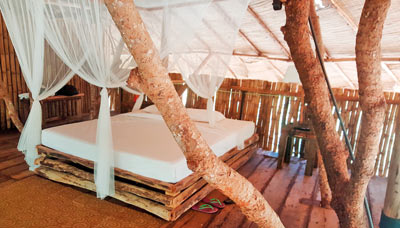Essence of Sri Lanka captured by Saraii

Making curd
HAMBANTOTA – Unlike Elizabeth, who went up a tree in Kenya a Princess and came down a Queen back in 1952, I stumbled down the tree house at Saraii Village in Weerawila still very much a commoner last month. Yes, I had an encounter with a frog in the loo of the tree house, but there was no regal ending to that meeting. The only stately relevance to my adventure in the branches was remembering the story of how the present Queen of England came down Treetops as a monarch after the death overnight of her father, George VI.
Yet, there had been kingly pleasure the previous evening as I surveyed a sunset fit for royalty from the first-platform sitting room (the bedroom area was above) with an iced sundowner in my hand. I had just returned from watching how buffalo curd was made and there was a feeling of satisfaction in the pit of my stomach. Heaped helpings of fresh curd and honey also helped. This is what is on offer at Saraii Village, an eco-hotel start-up (saraiivillage.com), founded by Charitha Abeyratne who had the bright idea of offering guests, local and tourists, the opportunity to experience traditional life in natural settings.
The word Saraii means “the essence” in Hebrew and it wonderfully captures the hospitality of the South of Sri Lanka. Only 259 km from Colombo – a leisurely four-hour drive along the highway to Matara then on to Hambantota and Weerawila – the eco-friendly hotel boasts of four tree houses and five mud chalets, a restaurant/dining area plus a small salt water swimming pool.

Charitha Abeyratne
MBA programme helped
It is built on a two and-a-half acre plot of land owned by Charitha’s husband Prasanna Hettiarachchi. We are greeted with ice-cold towels by Seyed Arshad, the senior relations executive, who proudly informs us that not one tree was felled during the building of the village. Opened just over three years ago, Saraii was an idea that needed a lot of effort and hard work ploughed in. With a glimmer of the idea in her head, Charitha went to the United States and enrolled in an MBA programme that focused on Global Social Sustainable Enterprise at the Colorado University. The plan was to give visitors a true ‘essence’ of being in Sri Lanka. On arrival we are shown a line of mountain bikes and informed that we could go on an exploration of the area.
I prefer to explore the world in my dreams and I’m up my tree house faster than a monkey could scale a vertical obstacle with a banana in his hands. Refreshed after a couple of hours of kip, I climb down to terra firma ready to go on my first excursion – the making of buffalo curd. Gamini, the third-generation owner of the family-owned enterprise is all in a froth, as two huge urns of milk, 80 litres, has been spoiled. He goes around Tissamaharama collecting the milk from farmers and there is no way he can be certain of its purity until he returns and tests it at home. Despite the spoilt milk, Gamini and his family are soon busy pouring the rest of the collection into six large cauldrons placed over crackling wood fires.

Tree-House
Curd – fresh from the village
The entire process is laborious – the blisters in my hands from churning the milk are proof – and takes more than two hours. The end product is 300 pots of curd which will be transported to Colombo the very next day. Saraii has 16 staff in total, all employed from the area. This is one of the key facets of the enterprise – giving the local community employment opportunities. Even the curd tour gives a financial boost to Gamini – he gets half of the 600 rupees Saraii charges guests. It is more expensive to go on an angler’s potluck tour – a few thousand rupees more. But early next morning,
we are up bright and breezy, a relative term as the warm May night had been still, ready to face a boating excursion with the fishermen of Weerawila. The lake is beautiful and there is an abundance of fresh water fish teeming below the surface. Net fishing has been banned for a few months as the government had just introduced fry, young trout, into the lake. So we had to make-do with wooden poles with hooks lined with squirming worms. After a few unsuccessful casts, I emulate Kumara, the fisherman, and gleefully pull up my first catch for the day, a small freshwater fish the span of my hand. It is the first of many but the one that got away, with my hook in his mouth, brings regret and a premature end to the wonderful experience.
Pol sambol fit for a king
It is not over, however. Back on shore, Kumara pulls out a knife and deftly cleans the fish pulling out its insides which he throws to an elegant egret watching from a bark above. The hotel has provided all the ingredients for a fish curry which is soon bubbling over a makeshift stove. A mat is placed and we sit around with plates in our hand while the curry is ladled in. Thick slices of bread and a piquant pol sambol make it a meal fit for a king. Like Oliver Twist, I ask for more. The experience is worth every cent. Saraii takes pride in just that – giving their guests something to remember for the rest of their lives.
A full-board stay for two is between rupees 16,000 and 30,000 (depending on tree house or mud chalet) and excursions are extra. I have to return to Colombo soon otherwise a more leisurely stay could have meant more time to take in a bird tour, a wildlife tour, a lake tour, barbecue by the beach tour at night among others. Trip Advisor has rated Saraii as one of the top 10 treetop hotels in the world. Another couple of fans in the bedroom area and I would wholeheartedly agree. Perhaps the next Saraii Village – plans are afoot to build in five more locations around the island – in Ella might be just perfect.
| Try and try again – Never give up! | |
| Face your fears with confidence and don’t be afraid to change your business model mid-stream are the twin tips Saraii founder Charitha Abeyratne has to offer all budding entrepreneurs hoping to make their start- up a roaring success. “Fear is the only thing keeping us from reaching the top whether it in the hospitality industry or any other. There definitely will come a time when you feel like giving up and you wonder what you are doing with your life. But don’t wallow in that and look at any problem as an ‘opportunity’ to learn something new,” are her words of wisdom. With competition intense in her business, Charitha believes that carving out a niche and listening to the customer has given her an edge. She also insists that the best way forward is to be flexible enough to change to the “needs of your customers and be unafraid to change your business model”. Charitha stressed: “do not be deterred by negativity that might come your way from industry experts, friends or colleagues. If you are passionate about what you are doing, you can achieve your dreams”. It was while she was involved with Saaraketha Organics that she had the bright idea to start Saraii. “We worked with rural farming communities, empowering them to adopt sustainable methods of production,” she explained. “I was very keen to support these rural communities with additional revenue sources which led me to focusing on eco/agro tourism. Since I had no formal educational or work experience in hospitality or is setting up a socially sustainable business I felt it was crucial to gain some meaningful knowledge and I found an MBA programme in Colorado State University that offered in-depth know-how on setting up a social business.” Challenging start There were times I would go into certain government agencies for approvals and I was asked if it was my father or husband who set up the company for me as a gift. They were surprised when they heard of how I started Saraii and I could see their amusement turn into respect. The lesson from all of this is the ‘never give up’. Perseverance is the key to building a successful venture.” |


